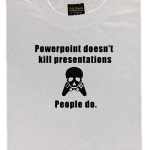
PowerPoint doesn’t kill presentations – people do
Bent Meier Sørensen, a Professor in the Department of Management, Politics and Philosophy, Copenhagen University wrote an impressive article in The Independent last week about using PowerPoint (and social media) in teaching. It was impressive in that it could have been a killer parody of techno-phobia and -determinism, written by someone who actually knows what they’re […]

Equality and diversity: an example of Socratic Questioning
A recent LLI meeting reflecting on how we could apply the University wide Equality and Diversity training to our teaching, revealed a strong connection to criticality. To critically question the assumptions, viewpoints, power dynamics and other issues that we hold to be the accepted norm can cause us to challenge barriers around race, gender, sexual […]
A graduate’s perspective on innovations in learning and teaching
I am a recent Chemistry graduate from the University of Leicester, and I am currently working as an intern at the Leicester Learning Institute. During my first week at the LLI, I was tasked with getting to know everyone at the LLI by having an informal chat around the topic of innovation in learning […]
New teaching resources to support students’ learning
We’ve recently added new resources to our learning development teaching resource page. These resources provide teachers with exercises and materials they can adapt and contextualise for their own disciplinary contexts. Current resources are organised under the three categories below. A fourth, focussing on supporting students’ presentation skills, will be added very shortly. Teaching resources to support […]

Reflections on the ALT conference 2016
In September Alex Moseley, Matt Mobbs, Stephen Walker and myself attended the ALT (Association for Learning Technology) Conference at the University of Warwick. This annual conference provides an opportunity to share learning technology research, practice and policy work from across sectors. The theme this year was Connect, Collaborate, Create – the full programme is on […]

Using the different types of blog in Blackboard
Blogging is a good way to get students to engage with a topic and to collaborate with each other. Students can prepare for seminars or tutorials, allowing the teacher to move to deeper learning more quickly. Writing and critical skills can also improve. Quieter and less confident students can prepare their contributions and have their […]
Assessment as dialogue
The following is a brief summary of a session on assessment as dialogue. The session ran on Wednesday, 14th September, as part of the LLI’s Focus On… activities. The themes covered were: Reflecting on what we mean by dialogue in education and the different ways we might enable it Looking at assessment, feedback and dialogue […]

Crowdsourcing using an online noticeboard
Padlet is a free online noticeboard, which enables you to post thoughts and ideas on ‘sticky notes’. You can add text, images, video, links or documents to the board from any device, and it can be shared publically or with a closed group. There are several ways Padlet can be used in the classroom to aid […]
Using Turnitin to teach about plagiarism
Turnitin is not just for spotting plagiarism once an assignment is uploaded. It can be used to teach students about plagiarism. You can allow students to upload a version of an assignment and generate a similarity report as many times as they like before the due date. This will give you a chance […]
How to create a simple podcast using Audacity
Audio recordings and Podcasts are a good way to aid learning, and to use as a form of assessment. This short video explains how to record using Audacity, a free audio editing software. You can download Audacity from the Programme Installer on a university computer, or it is free to install on any […]

Recent Comments